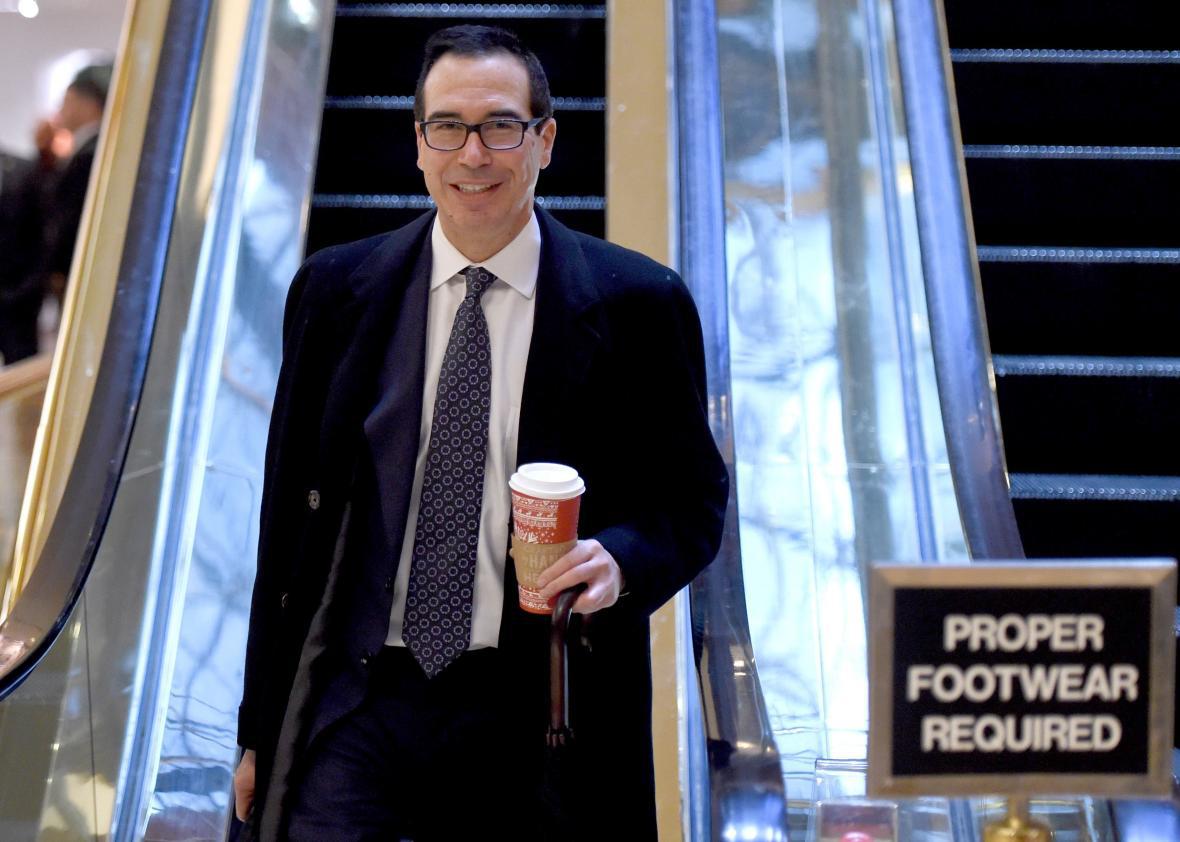Here is a thing that Donald Trump tweeted back in July, when few of us could imagine that his political ascendence might ruin our Thanksgiving:
The implication was that, unlike his opponent, Herr Trump might actually take on the big banks, since he didn’t owe them anything. This was beyond silly. The candidate had already pledged to dismantle most of President Obama’s Wall Street reforms. And by the summer, reports had begun to float around that he was interested in naming his campaign’s chief fundraiser, former Goldman Sachs executive and hedge funder Steve Mnuchin—a man the New Republic once referred to as “the anti-populist from hell,” no less—as Treasury secretary.
This week it appears Trump is finally making good on those plans. According to the New York Times, Mnuchin is expected to be named to the cabinet as early as Wednesday, all but ensuring that you’ll be seeing his signature on your cash for the next few years.
Who, exactly, is Mnuchin? To start, he’s the son of a Goldman banker who became a Goldman banker. He spent 17 years at the firm, eventually heading its mortgage department before becoming its chief information officer. In 2002, he ventured off to work at a series of hedge funds, one of which he started with George Soros, the billionaire investor who Trump featured in a not-so-subtly anti-Semitic ad about the evils of globalist financiers. Later, he teamed with a pair of Goldman buddies to form Dune Capital Management and got into backing Hollywood movies, including some blockbusters. He helped bankroll Avatar and X-Men, for instance, and was an executive producer on Suicide Squad.
Sadly, Mnuchin’s taste in superhero franchises is not the most objectionable thing about him. In 2009, he and a group that included Soros and hedge fund billionaire John Paulson bought up the charred remains of IndyMac, the California lender that failed early during the financial crisis. They rechristened it OneWest and reconstructed the bank into a thriving operation that became notorious for its (allegedly) despicable foreclosure practices. As David Dayen explained earlier this year at the New Republic:
Even among the many bad actors in the national foreclosure crisis, OneWest stood out. It routinely jumped to foreclosure rather than pursue options to keep borrowers in their homes; used fabricated and “robo-signed” documents to secure the evictions; and had a particular talent for dispossessing the homes of senior citizens and people of color.
This all culminated in a memorable protest on the lawn of Mnuchin’s Bel Air mansion, led by a foreclosed homeowner and activists from Occupy Los Angeles. Nonetheless, he and his partners earned a tidy profit when they sold OneWest to CIT Group for $3.4 billion in 2014. (To top things off, the bank was recently accused of discriminating against minority home buyers.)
Mnuchin seems to have become Trump’s finance chair virtually by accident. He had done business with the candidate before, but not always on friendly terms—Trump sued Dune and other lenders that had helped back his tower in Chicago (the case eventually settled). Mnuchin’s involvement in the campaign only started after Trump ran into him at his victory party following the New York primary. Trump dragged his old acquaintance on stage to act as a set piece during a speech. The next day, Trump asked him to run his fundraising operation, which at that point was all but nonexistent. Mnuchin took the job when many successful Wall Street types probably would have not.
So you might call Mnuchin an early investor, and if anything, his appointment represents Trump’s habit of rewarding loyalty over all else.
Here is something Mnuchin is not, though: an obvious ideologue. Some of the candidates that Trump reportedly passed over had deeply held, well-known convictions about the role of government overseeing finance. Rep. Jeb Hensarling has put together an entire bill to replace Dodd-Frank. Former BB&T Bank CEO John Allison is an Ayn Rand-worshipping gold bug who wants to eliminate the Federal Reserve and would burn pretty much every existing bank regulation in a funeral pyre. In contrast, it’s not clear Mnuchin has any fervent beliefs at all. Like Trump, Mnuchin had previously donated to Democrats, and during the campaign, his name wasn’t attached to any of the candidate’s major policy proposals. When asked about major economic issues, he apparently turns into a sphinx. Take this bit from a recent Businessweek profile:
Mnuchin won’t say whether Goldman’s Hank Paulson was a good Treasury secretary. Asked about the Dodd-Frank financial regulation act, he says there are good and bad things about it, without elaborating. He agrees to tell a story about helping to set up a photograph showing Trump eating McDonald’s food on his jet, but first he huddles with his deputy in another room. “I’m never the main attraction, OK?” he says. “I’m the facilitator.”
This is somewhat awkward coming from an incoming Treasury head. Traditionally, the secretary has played a key role shaping the White House’s economic policy and selling it to the public. To do that, it helps to have confident opinions about matters like financial regulation that you are comfortable evangelizing for in front of reporters and members of Congress. Frequently, the job is much more frontman than “facilitator.”
Then again, biographies sometimes speak louder than words. Trump has already made clear his intentions to let Wall Street run wild. Picking Mnuchin, a successful journeyman financier loathed by parts of the left, is another assurance that the industry will be treated just fine under the new regime.
